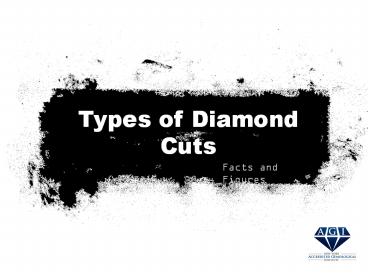Diamond Cuts and Shapes - Facts and Figures - PowerPoint PPT Presentation
Title:
Diamond Cuts and Shapes - Facts and Figures
Description:
Facts about diamond cuts and shapes are presented in this document by Accredited Gemological Institute. Address: 37 W 47 Street,Suite 503 , New York,NY 10036; Phone: 212-302-3700; Website: – PowerPoint PPT presentation
Number of Views:44
Title: Diamond Cuts and Shapes - Facts and Figures
1
Types of Diamond Cuts
Facts and Figures
2
What is Diamond Cut?
- The diamond cut is a style or design guide used
when shaping a diamond for polishing such as the
brilliant cut. Cut does not refer to shape (pear,
oval), but the symmetry, proportioning and polish
of a diamond. The cut of a diamond greatly
affects a diamond's brilliance this means if it
is cut poorly, it will be less luminous. - (Source WikiPedia)
3
Diamond Cuts and Shapes Explained
4
Round Diamonds
The round cut diamond is the most popular diamond
shape. Virtually all round diamonds are
brilliant-cut, meaning they have 58 facets (57
when there is no culet). (Source AGI NewYork)
- Introduced by Marcel Tolkowsky in 1919
- Number of Facets 58
- 95 of diamonds sold globally are round.
5
Princess Cut Diamonds
The Princess cut is the second most popular cut
shape for diamonds, next to a round brilliant(aka
round diamonds) and is the most popular fancy
diamond shape. It was created in 1960s.
- Introduced in 1980s
- Ideal length width ratio 1.1
- They are cheaper
6
Oval Cut Diamonds
Oval diamonds are a modified brilliant-cut (like
virtually all round cuts). Because the two shapes
possess a similar fire and brilliance, the oval
is an ideal choice for a customer who likes the
look of a round diamond, but wants something more
unique. (Source Lumera Diamonds)
- Created by Lazare Kaplan in the 1960's
- Ideal ration b/w length and width 1.75-2.25
- No of facets 58
- It may exhibit a bow-tie effect across the
center
7
Marquise Diamonds
This type of diamond cut is similar to Oval
Shape. The standard number of facets is 58, but
can have a varying number of pavilion main facets
ranging from 4, 6, or 8. (Source Vashi.com) Was
developed for King Louis XIV of France who wanted
a diamond that simulated the smile of Marquise de
Pompadour.
- Ideal length width ratio1.75-2.25
- Posses some degree of bow tie.
- One of the largest crown surface areas of any
diamond shape
8
Pear Shaped Diamonds
Pear shape is not one of the most popular shapes
these days. The standard number of facets of a
Pear shaped diamond is 58, and may have a varying
number of pavilion (lower) facets from 4, 6, 7,
or 8. (Source Vashi.com)
- Ideal length width ratio 1.45-1.75
- Number of facets 58
- It exhibits a bow-tie effect
9
Cushion Cut Diamond
Cushion cuts diamonds are square or rectangular
brilliant cuts with rounded corners and curved
sides, a pillow-like shape. (Source Price Scope)
- It is based on cut research initiated by Marcel
Tolkowsky in the 1920's - Introduced on early 1800s
- Ideal length width ratio 1-1.05
- No of facets 58
10
Emerald Cut Diamonds
The Emerald diamond cut is a step cut rectangular
shape with fewer facets than a brilliant cut. The
number of facets in an Emerald cut may vary from
50 to 58. (Source Vashi.com)
- Ideal length width ratio 1.3 1.4
- No of facets 50-58
11
Asscher Cut Diamonds
The original Asscher cut design has 58 facets and
was never patented. (Source Diamonds.Pro)
- Introduced BY Joseph Asscher in 1902
- Ideal length width ratio 1-1.05
- Around 2002 it was introduced again after its 1st
creation
12
Radiant Cut Diamonds
This very special cut is the result of one mans
dream to combine the elegance of an Emerald Cut
with the unparalleled brilliance of a Round
Brilliant Cut. (Source Diamond Registry)
- Introduced little more than 20 years
- Ideal length width ratio 1-1.05
- I has bow tie effect
- No of facets 70
13
Heart Shaped Diamonds
The heart is the ultimate symbol of love. The
standard number of facets of a Heart cut diamond
is 59, but can have a varying number of pavilion
(lower) facets ranging from 4, 6, 7, or
8. (Source Vashi.com)
- Ideal length width ratio 0.5-1.1
- No of facets 59
- Its powerful symbol of Love
14
Trillion Cut Diamond
Trillion cut stones are three sided (triangular)
cuts. The trillion cut used to be reserved for
side stones only, but can easily hold their own
as solitaires or are often featured in pairs as
complementary center stones (Source Wedding LDS)
- Introduced by the Asscher brothers in Amsterdam
- Was later trademarked by the Henry Meyer Diamond
Company of New York in 1962 - Also known as Trillions and Trilliants
- optimal length to width ratio for Triangular cuts
is 11.
15
Presented by Accredited Gemological Institute
AGINewYork.com

